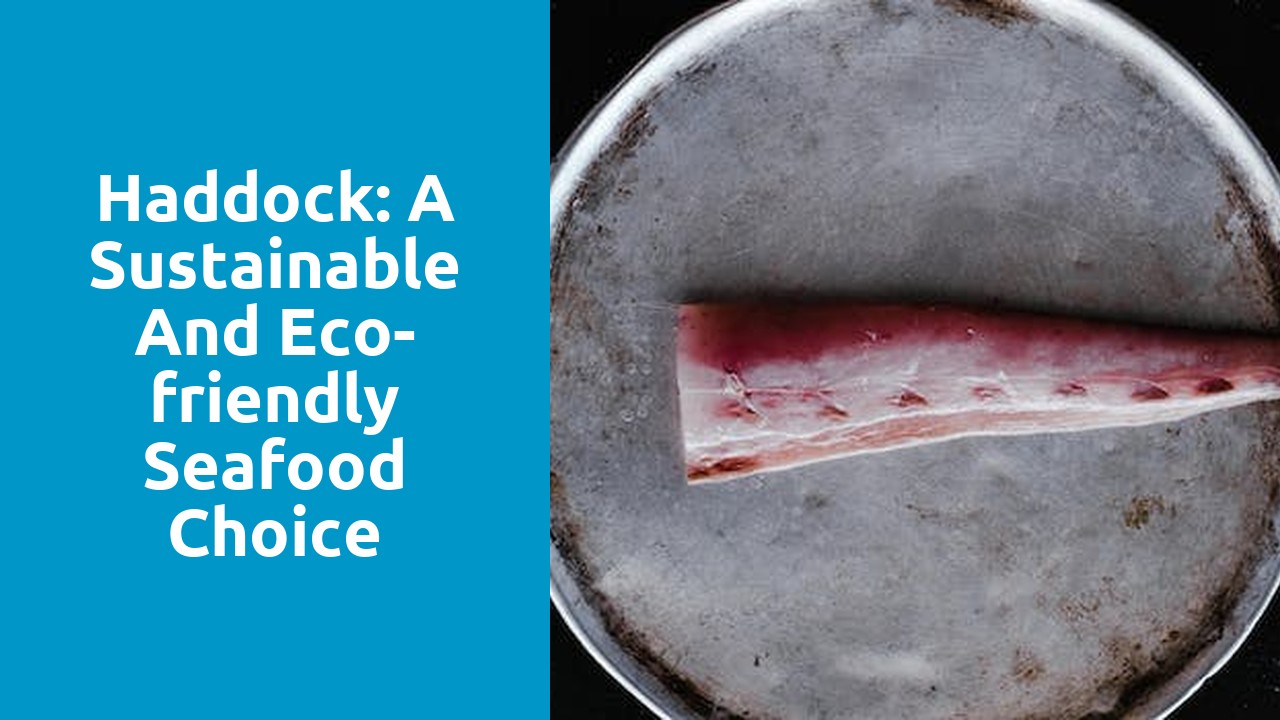Haddock: A sustainable and eco-friendly seafood choice

Table Of Contents
Why Haddock is the Perfect Choice for Sustainable Seafood Lovers
Haddock is undoubtedly the perfect choice for sustainable seafood lovers looking to make a positive impact on the environment while still enjoying their favorite seafood dishes. This white, flaky fish is not only delicious, but it also ticks all the boxes when it comes to sustainability.
First and foremost, haddock is a species that is abundantly available in our oceans. It is not at risk of overfishing or depletion, making it a reliable choice for those concerned about the future of our marine ecosystems. By opting for haddock, you can have peace of mind knowing that you are not contributing to the decline of a vulnerable species.
Exploring the Environmental Benefits of Choosing Haddock
Haddock is not only a delicious choice for seafood lovers, but it is also an environmentally-friendly option. Choosing haddock as your seafood of choice comes with a host of environmental benefits. One of the key advantages is that haddock is a highly sustainable fish species. This means that its population is able to replenish itself naturally without being overfished. By consuming haddock, you are playing a role in maintaining the delicate balance of our marine ecosystems.
Moreover, the fishing methods used to catch haddock are often more environmentally-friendly compared to other fishing practices. Many haddock fisheries employ techniques such as longlining or hook-and-line fishing, which have a lower impact on sea habitats and reduce bycatch of non-target species. Additionally, haddock is often found in abundance in colder waters, such as those in the North Atlantic, which reduces the need for excessive fuel consumption by fishing vessels. By opting for haddock, you are not only treating your taste buds, but also minimizing your carbon footprint on the planet.
The Delicious and Ethical Choice: Haddock as a Sustainable Seafood Option
Haddock, with its delicate flavor and firm white flesh, is not only a delicious choice but also an ethical one for seafood enthusiasts. As concerns about overfishing and the depletion of fish populations rise, choosing sustainable seafood options has become more important than ever. Thankfully, haddock fits the bill perfectly.
This versatile fish is known for its fast growth rate and abundant availability, making it a sustainable choice for consumers. Haddock populations are carefully managed to ensure their long-term survival, with strict regulations on catch limits and fishing methods. By opting for haddock, diners can enjoy a delectable meal while also supporting ocean conservation efforts and preserving fish stocks for future generations.
Understanding the Impact: How Haddock Supports Ocean Conservation
The choice to consume haddock as a sustainable seafood option goes beyond the pleasures of a delicious meal; it also comes with significant benefits for ocean conservation. By opting for haddock, we are actively contributing to the preservation of marine ecosystems and the protection of vulnerable species. Haddock populations are carefully managed through strict fishing regulations, ensuring that the stocks remain healthy and abundant. This approach helps in preventing overfishing and ensures the long-term sustainability of haddock populations, consequently preserving the delicate balance of our oceans.
Furthermore, the fishing methods employed to catch haddock play a crucial role in minimizing harm to other marine life and habitats. Unlike some other fishing practices, the majority of haddock harvesters utilize methods that have minimal impacts on the ocean floor, reducing the risks of habitat destruction and disturbance. By supporting sustainable haddock fisheries, we are promoting the use of techniques that minimize bycatch - the unintentional capture of non-target species. This approach helps protect marine biodiversity by significantly reducing the accidental capture and subsequent mortality of marine creatures such as seabirds, turtles, and other fish species.
From the Sea to Your Plate: The Journey of Haddock as a Sustainable Seafood
From the moment it is plucked from the icy waters of the North Atlantic, haddock embarks on a journey that is designed to ensure its sustainability as a seafood option. The process begins with strict quotas and regulations set by fisheries management organizations. These measures are put in place to control the amount of haddock that can be harvested, with the ultimate goal of maintaining healthy fish stocks and preserving the delicate marine ecosystem.
Once haddock is caught, it is carefully handled and immediately chilled to maintain its freshness. It is then transported to processing facilities where it undergoes strict quality control inspections. These inspections ensure that only the highest quality haddock reaches the market, offering consumers a product that is not only sustainable but also delicious. From there, haddock finds its way to local seafood markets, restaurants, and ultimately onto the plates of seafood lovers who value both their taste buds and the health of our oceans. The journey from sea to plate is not only a testament to the hard work of those involved in the fishing industry, but also to the commitment of consumers to make a positive impact through their seafood choices.
Making a Difference: Why Haddock Should Be Your GoTo EcoFriendly Seafood
Haddock has emerged as a leading choice for eco-conscious seafood lovers, and for good reason. This delectable fish not only satisfies the taste buds but also supports sustainable fishing practices. By opting for haddock, you can actively contribute to efforts aimed at preserving our ocean ecosystems and safeguarding the future of our seafood supply.
One key factor that sets haddock apart is its abundant population. As a species, haddock is known for its resilience and ability to reproduce rapidly. This means that when you choose haddock, you are supporting a fishery that can sustainably yield a significant catch without depleting the population. By prioritizing this eco-friendly seafood option, you are making a tangible difference in promoting responsible fishing practices and ensuring the long-term viability of our oceans.
Related Links
The best recipes for preparing frozen haddockExploring the taste profile of frozen haddock